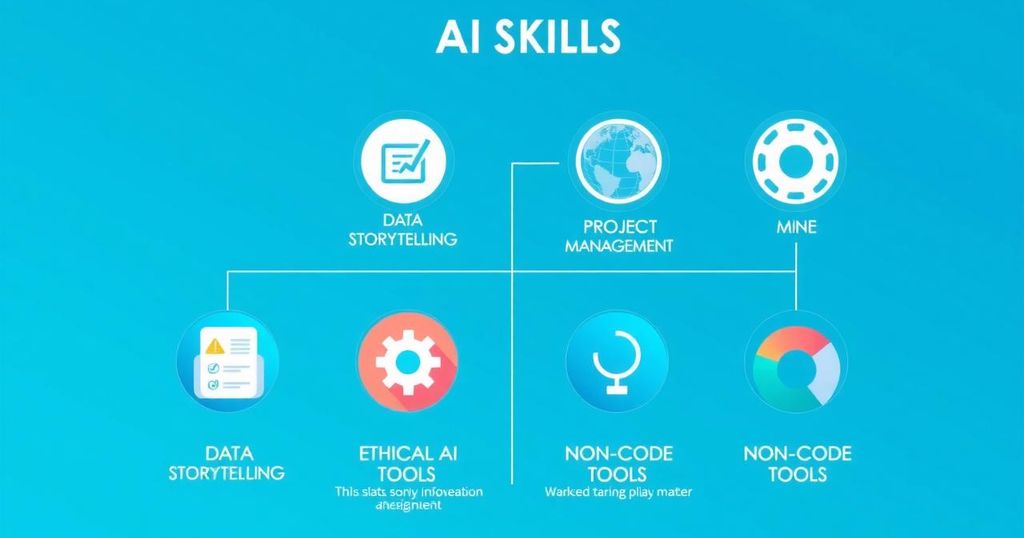Top 10 Essential AI Skills for the Modern Professional
As AI expands across various sectors, non-technical roles are rapidly growing. This article outlines ten crucial AI skills anyone can learn, such as AI literacy, no-code tools, data storytelling, ethical practices, and continual learning, enabling professionals to navigate and thrive in the evolving AI landscape.
In the age where artificial intelligence (AI) is infiltrating every aspect of our lives, a whole new realm of opportunities opens for various professionals, even those without coding experience. Non-technical roles centered on AI are blooming at an impressive rate, pushing the boundaries of who can join the AI conversation. Here, we shall explore ten essential AI skills that anyone can harness.
1. AI Literacy & Conceptual Understanding
Grasping the foundational concepts of AI is more vital than simply knowing how to build one. Individuals familiar with AI terminology can bridge the gap between technical teams and broader business opportunities, enhancing decision-making and fostering innovation.
2. No-Code Machine Learning Tools
The emergence of no-code tools has lifted coding barriers. Users can create predictive models seamlessly by uploading spreadsheets, as facilitated by platforms like Obviously AI and Google’s Teachable Machine. These tools allow any team, especially marketers, to leverage AI for actionable insights, such as predicting customer churn, thus significantly boosting revenue potential.
3. Data Storytelling & Visualization
Converting complex AI insights into compelling narratives is a critical skill, often overshadowing the importance of pure technical abilities. The power of visualization tools like Tableau transforms data into impactful stories, aiding decision-making and enabling businesses to make data-driven strides more effectively.
4. AI-Augmented Decision Making
While AI can generate recommendations, the human element remains crucial. Understanding how to blend AI suggestions into actual decision-making processes is a vital skill. This includes recognizing the trust levels in AI vs. human judgment, ultimately leading to improved feedback loops that refine future recommendations.
5. Basic Principles of Prompt Engineering
Prompt engineering caters to non-programmers by making it a form of effective communication with AI. By focusing on specificity and context in delivering commands, anyone can enhance AI outputs. It’s about teaching AI to respond accurately based on the requirements you set.
6. Domain Expertise Application
Successful AI implementation frequently hinges on business knowledge rather than technical prowess. Professionals who understand their industry can automate repetitive tasks and analyze extensive data sets more efficiently than many programmers. Identifying where AI can significantly reduce workload is crucial in translating business needs into technical solutions.
7. AI Project Management
Leading AI projects requires a grasp of common initiative pitfalls without needing to build the systems. Adopting AI-oriented project management strategies helps guide non-tech-focused professionals to orchestrate effective implementations. Courses like the AI Product Management specialization on Coursera pave the way for structured management learning.
8. AI Ethics and Responsible Implementation
The conversation around AI ethics invites diverse viewpoints, making it an accessible area for professionals across fields. Non-technical team members may effectively spot biases or ethical dilemmas that developers might overlook, enhancing the robustness of ethical AI frameworks and promoting fair representation in AI usage.
9. Selection and Evaluation of AI Tools
With countless AI tools available, the ability to assess and select the right ones is invaluable. This skill encompasses understanding business needs, vetting vendor claims, and measuring actual results without requiring deep technical expertise.
10. An Eternal Learning Mindset for AI
Cultivating a habit of continuous learning about AI is essential to keep pace with rapid changes in the field. Emphasizing conceptual growth rather than immediate technical know-how will guide developments toward genuine business priorities, making learning an advantageous pursuit in the evolving AI landscape.
Future View
The notion that smart programs demand rigid programming skills has crumbled. Today’s successful organizations thrive on diverse teams, leveraging a multitude of perspectives to navigate the complexities of AI. The spectrum of AI skills ensures that professionals from all backgrounds can significantly contribute to the AI revolution, turning even modest technologies into practical solutions that yield profound results.
The evolving landscape of artificial intelligence presents a wealth of skills that can empower individuals, regardless of their technical backgrounds. From AI literacy to ethical sourcing, mastering these ten skills can position professionals to thrive in an AI-driven world. Embracing a diversity of experiences and continuous learning is pivotal to unlocking the full potential of AI, ensuring that everyone can participate in this technological revolution.
Original Source: www.analyticsinsight.net




Post Comment